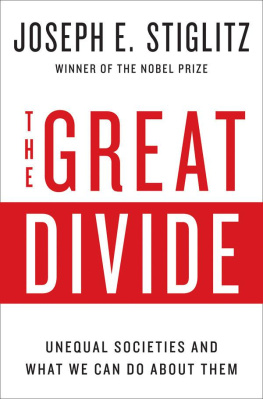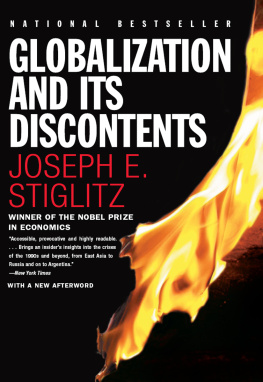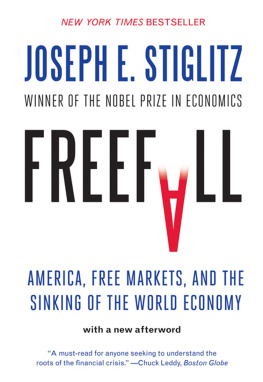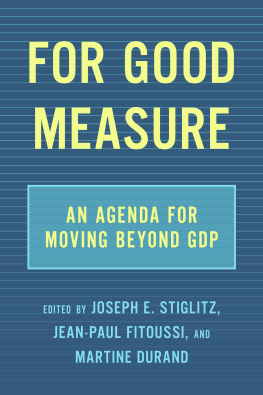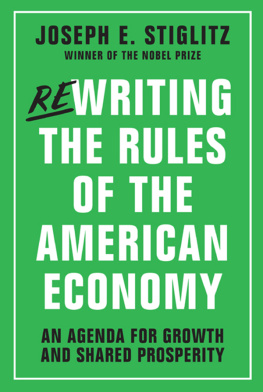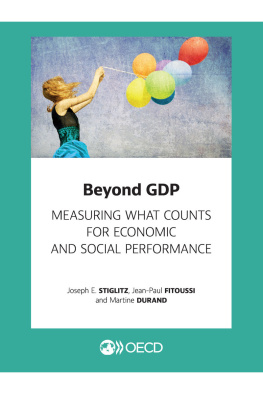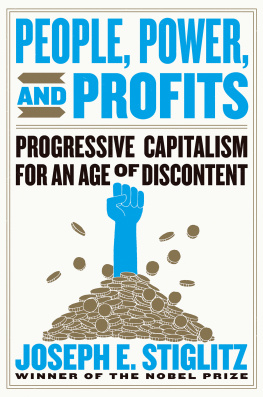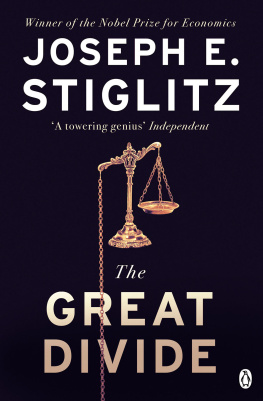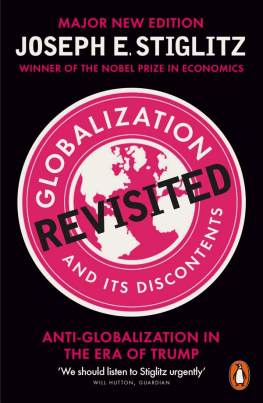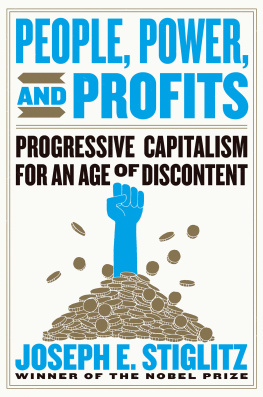The Great Divide: Unequal Societies and What We Can Do About Them Joseph E. StiglitzW. W. Norton Company (2015)
How has America become the most unequal advanced country in the world, and what can we do about it? In The Great Divide, Joseph E. Stiglitz expands on the diagnosis he offered in his best-selling book The Price of Inequality and suggests ways to counter Americas growing problem. With his signature blend of clarity and passion, Stiglitz argues that inequality is a choicethe cumulative result of unjust policies and misguided priorities.Gathering his writings for popular outlets including Vanity Fair and the New York Times, Stiglitz exposes in full America's inequality: its dimensions, its causes, and its consequences for the nation and for the world. From Reagan-era to the Great Recession and its long aftermath, Stiglitz delves into the irresponsible policiesderegulation, tax cuts, and tax breaks for the 1 percentthat are leaving many Americans farther and farther beyond and turning the American dream into an ever more unachievable myth. With formidable yet accessible economic insight, he urges us to embrace real solutions: increasing taxes on corporations and the wealthy; offering more help to the children of the poor; investing in education, science, and infrastructure; helping out homeowners instead of banks; and, most importantly, doing more to restore the economy to full employment. Stiglitz also draws lessons from Scandinavia, Singapore, and Japan, and he argues against the tide of unnecessary, destructive austerity that is sweeping across Europe.Ultimately, Stiglitz believes our choice is not between growth and fairness; with the right policies, we can choose both. His complaint is not so much about capitalism as such, but how twenty-first-century capitalism has been perverted. His is a call to confront America's economic inequality as the political and moral issue that it is. If we reinvest in people and pursue the other policies that he describes, America can live up to the shared dream of a more prosperous, more equal society.

THE
GREAT
DIVIDE

Unequal Societies and
What We Can Do About Them
J OSEPH E. S TIGLITZ

To my many readers, who have responded with such enthusiasm
to my writings on inequality and opportunity.
To my children, Siobhan, Michael, Jed, and Julia,
and my wife, Anya, all of whom, in their own way,
are striving to create a fairer and better world.
And to the scholars and activists everywhere who work with
such dedication for social justice.
Thank you for the inspiration and encouragement you have provided.
C ONTENTS


N O ONE TODAY CAN DENY THAT THERE IS A GREAT DIVIDE in America, separating the very richestsometimes described as the 1 percentand the rest. Their lives are different: they have different worries, different aspirations, and different lifestyles.
Ordinary Americans worry about how they will pay for the college education of their children, about what happens if someone in the family has a serious illness, about how they are to manage their retirement. In the depths of the Great Recession, tens of millions worried whether they would be able to keep their house. Millions werent able to do so.
Those in the 1 percentand even more the upper .1 percentdebate other issues: what kind of jet airplane to buy, the best way to shelter their income from taxes (What happens if the United States forces the end to bank secrecy in Switzerlandwill the Cayman Islands be next? Is Andorra safe?). On the beaches of Southampton they complain about the noise their neighbors make as they helicopter in from New York City. They worry, too, about what would happen if they fell off their perchthere is so far to fall, and on rare occasions it does happen.
Not long ago I found myself at a dinner party hosted by a bright and concerned member of the 1 percent. Aware of the great divide, our host had brought together leading billionaires, academics, and others who were worried about inequality. As the evenings early chitchat burbled on, I overheard one billionairewho had gotten his start in life by inheriting a fortunediscuss with another the problem of lazy Americans who were trying to free ride on the rest. Soon thereafter, they seamlessly transitioned into a discussion of tax shelters, apparently unaware of the irony. Several times in the evening, Marie Antoinette and the guillotine were invoked as the gathered plutocrats reminded each other of the risks of allowing inequality to grow to excess: Remember the guillotine set the tone for the evening. And in that refrain they confessed a central message of this book: the level of inequality in America is not inevitable; it is not the result of inexorable laws of economics. It is a matter of policies and politics. It was, they seemed to be saying, possible for these powerful men to do something about inequality.
This is but one of the reasons why concern about inequality has become urgent even among the 1 percent: increasing numbers of them realize that sustained economic growth, upon which their prosperity depends, cant happen when the vast majority of citizens have stagnant incomes.
Oxfam brought home forcefully the extent of the worlds growing inequality to the annual gathering of the worlds elite in Davos in 2014, pointing out that a bus with some 85 of the worlds billionaires had as much wealth as the bottom half of its population, some three billion people. By a year later the bus had shrunkit required only 80 seats. Just as dramatic, Oxfam found that the top 1 percent of the world now owned nearly half the worlds wealthand are on track to own as much of the rest of the 99 percent combined by 2016.
The great divide has been a long time in coming. In the decades after World War II the country grew at its fastest pace, and the country grew together. While all segments saw an increase in their incomes, it was shared prosperity. Incomes of those at the bottom grew faster than the incomes of those at the top.
It was a golden age in America, but to my young eyes there appeared darker edges. Growing up on the southern shore of Lake Michigan, in one of the countrys iconic industrial towns, Gary, Indiana, I saw poverty, inequality, racial discrimination, and episodic unemployment as one recession after another battered the country. Labor strife was common as workers struggled to get a fair share of Americas deservedly lauded prosperity. I heard rhetoric about America being a middle-class society, but for the most part, the people I saw occupied the lower rungs of that supposed middle-class society, and their voices were not among those that were shaping the country.
We were not rich, but my parents had adjusted their lifestyle to their incomesand in the end that is a big part of the battle. I wore hand-me-down clothes from my brother that my mother had always bought on sale, with an eye toward durability rather than saving money in the short run: penny wise but pound foolish, she would say. When I was growing up, my mother, who had graduated from the University of Chicago in the midst of the Great Depression, helped my father in his insurance business. When she was working, we were left in the care of our help, Minnie Fae Ellis, a loving, hardworking, and bright woman. Even as a 10-year-old, I was disturbed: I wondered, Why did she have only a sixth-grade education, in a country that was supposedly so rich and that supposedly offered opportunities for all? Why was she taking care of me rather than her own children?
Next page
